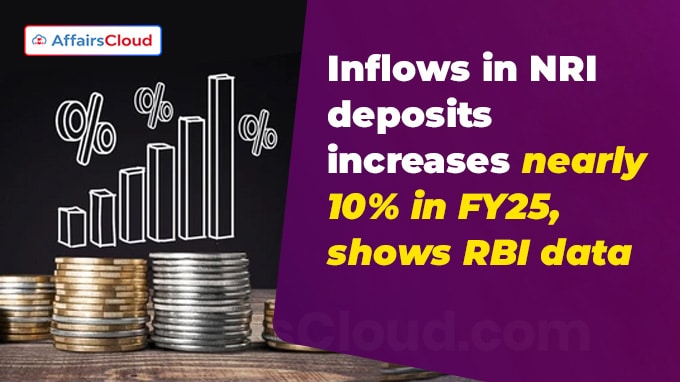 In May 2025, the Reserve Bank of India (RBI) released its latest monthly bulletin, revealing that Non-Resident Indian (NRI) deposits in Indian banks soared to an 11-year high in the financial year 2024-25 (FY25). The total inflows reached USD 16.16 billion (Rs.1,38,911 crore), marking a 9.9% Year-on-Year (YoY) increase in FY25 from USD 14.7 billion (Rs. 26,361 crore) in FY24.
In May 2025, the Reserve Bank of India (RBI) released its latest monthly bulletin, revealing that Non-Resident Indian (NRI) deposits in Indian banks soared to an 11-year high in the financial year 2024-25 (FY25). The total inflows reached USD 16.16 billion (Rs.1,38,911 crore), marking a 9.9% Year-on-Year (YoY) increase in FY25 from USD 14.7 billion (Rs. 26,361 crore) in FY24.
- The total outstanding NRI deposits stood at USD 164.7 billion (Rs.14,15,761 crore) as of March 2025, marking an increase from USD 151.9 billion (Rs.13,05,732 crore) recorded in March 2024.
Key Highlights of NRI Deposit Inflows in FY25:
1.Foreign Currency Non-Resident (Bank) [FCNR(B)] Deposits:
i.Inflows rose 11% YoY to USD 7.1 billion (Rs.61,032 crore) in FY25, up from USD 6.3 billion (Rs. 54,155 crore) in FY24.
- The surge in FCNR(B) deposits is attributed to competitive interest rates offered by Indian banks and the depreciation of the Indian rupee, which enhanced returns for NRIs.
ii.The outstanding FCNR(B) deposits reached USD 32.8 billion (Rs.2,81,949 crore) as of March 2025.
2.Non-Resident External (NRE) Rupee Accounts [NRE(RA)]:
i.Inflows grew to USD 4.7 billion (Rs. 40,401 crore) in FY25, up from USD 4.2 billion (Rs. 36,103 crore) in FY24.
ii.The outstanding NRE deposits stood at USD 100.7 billion (Rs. 8,65,617 crore) as of March 2025.
3.Non-Resident Ordinary (NRO) Accounts:
i.Inflows rose to USD 4.4 billion (Rs. 37,822 crore) in FY25 up from USD 4.2 billion (Rs. 36,103 crore) in FY24.
ii.The outstanding NRO deposits was at USD 31.1 billion (Rs. 2,67,336 crore) as of March 2025.
About Non-Resident Indian (NRI) Deposits Scheme:
i.A Non-Resident Indian (NRI) is an Indian citizen residing outside India for the purpose of employment, business, or vocation.
ii.NRIs deposit funds in Indian banks mainly due to the higher interest rate differential between India and their country of residence.
iii.The NRI deposit schemes are regulated by the Reserve Bank of India (RBI) and include three main types:
- Foreign Currency Non-Resident (Bank) [FCNR(B)] Deposits
- Non-Resident External (NRE) Rupee Accounts [NRE(RA)]
- Non-Resident Ordinary (NRO) Accounts
1.Foreign Currency Non-Resident (Bank) [FCNR(B)] Deposits
i.NRIs or Persons of Indian Origin (PIOs) can open this account in designated foreign currencies permitted by RBI.
ii.These are term deposit accounts, not savings accounts.
iii.FCNR deposits are fully repatriable, i.e., both principal and interest can be transferred abroad.
iv.There is no currency risk for the depositor; the bank bears the foreign exchange risk.
v.The principal and interest earned are tax-free in India.
2.Non-Resident External (NRE) Rupee Accounts
i.These are Indian Rupee (INR) denominated accounts offering options such as savings, current, recurring, or fixed deposits.
ii.Funds in the account must originate from foreign income.
iii.These accounts are fully repatriable.
iv.Interest and principal are exempt from income tax in India.
3.Non-Resident Ordinary (NRO) Accounts
i.Designed to manage income earned in India such as rent, pension, interest, dividends, or sale of assets.
ii.Can be funded through INR or permitted foreign currencies, but withdrawals are only allowed in INR.
iii.These are not freely repatriable; repatriation is subject to certain conditions and limits (currently up to USD 1 million per financial year)
iv.Interest income is taxable in India as per applicable income tax laws.
Note: The interest income earned from NRO accounts is taxed at a rate of 30% under the Indian Income Tax Act.




